Page 2/5 of Discipleship Groups at Oakwood
Page 1 – Page 2 – Page 3 – Page 4 – Page 5 / Audio / Resources
Session 2 Audio
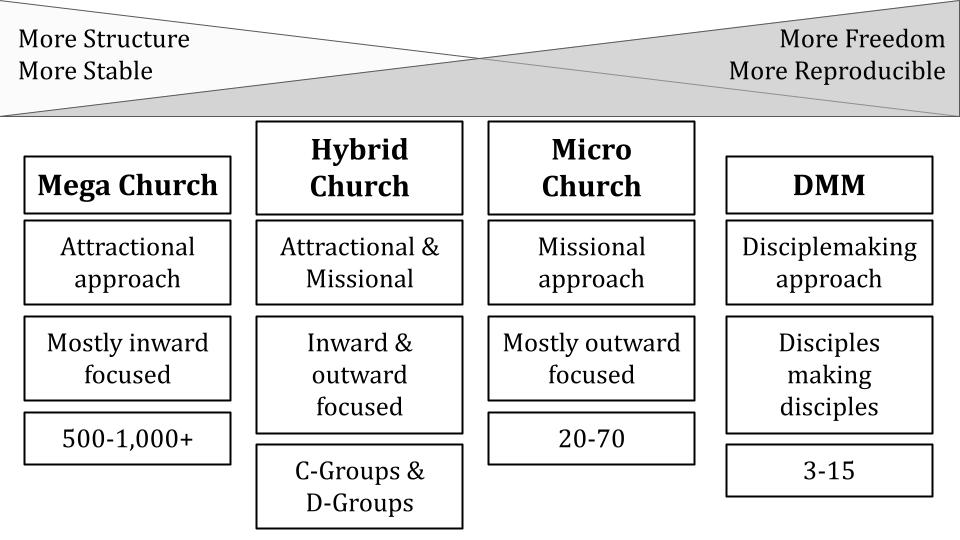
There are four basic approaches to church and disciplemaking. The Mega Church model seeks to attract as many people as possible to its worship services and other programs. So while they use the language of outreach and evangelism, the approach is mostly inward focused – on growing that particular church and spreading that “brand” through additional venues and campuses. The Hybrid Church attempts to leverage both the attractional “come and see” approach to church growth alongside the missional “go and tell” approach to outreach. It seeks to balance inward focused community and care with outward focused evangelism and service. Community Groups are the primary tool for connection and care while smaller Discipleship Groups mobilize outreach and more personalized training.
The Micro Church or missional community model lets go of traditional church programs and resources including a building, paid pastor, primary worship gathering, kids and youth programming etc., in order to focus on reaching a specific target audience with the gospel – such as a neighborhood or needy group (e.g. homeless, addicts, veterans, at risk teens etc.). By focusing outward, upward (worship) and inward (fellowship) take place as believers work together on mission. Finally, the DMM (Disciple-making movement) model is entirely focused on training disciples to reach and train more disciples. This training has a strong outward emphasis on praying for and reaching lost people, then immediately training them to reach their friends and family members. A network of several Discipleship Groups will gather periodically for worship, fellowship and training but the primary gatherings are intentionally coached and supported D-Groups where leaders train their disciples to become disciplemakers.
Our strategy at Oakwood is to become a HYBRID CHURCH – fully utilizing our campus, programs and Community Groups to attract people into our Christ-exalting, Gospel-centered fellowship while at the same time building a disciplemaking culture that mobilizes believers in Discipleship Groups to serve and reach the people around them.
Jesus was the Master of both the attractional and the missional. He knew how to draw a crowd and attract lots of people through public healings, miracles, addressing felt needs (like food) and powerful preaching. But even as he sought to reach many through his broad public ministry, the Lord focused his time and effort on a small Discipleship Group.
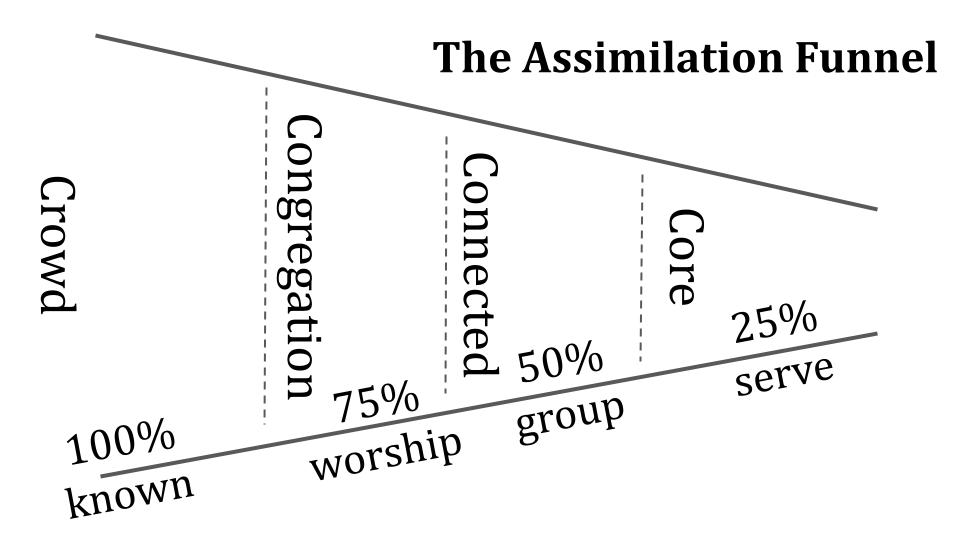
The Attractional church uses this basic assimilation funnel to draw people in from general awareness of the church to regular involvement, then relational connection and ultimately into long term commitment and service. Notice the inevitable decline of engagement, even in a healthy church, where it’s an amazing Sunday that 75% of the congregation shows up for worship. And it’s a healthy, well-connected church that has 50% or more of their total list of involved people regularly meeting in a small group.
Some churches may push hard to have 30-40% of those regular attendees serving in some way, but it is usually the core 20% who do most of the work while others serve for an hour or two per month. Will Mancini, in Future Church (2020), exposed the weaknesses of this model in our modern American “Great Commission”: “Therefore go and make worship attenders, teaching them to join a small group and volunteer for one hour each week.”
Mancini’s book, along with several other recent books (notably Damian Gerke’s In the Way and Ford and Wegner’s TheStarfish and the Spirit) are calling the American church to a new commitment to the old ways of disciplemaking. Robert Coleman’s classic The Master Plan of Evangelism outlines how Jesus changed the world by investing in 12 men.
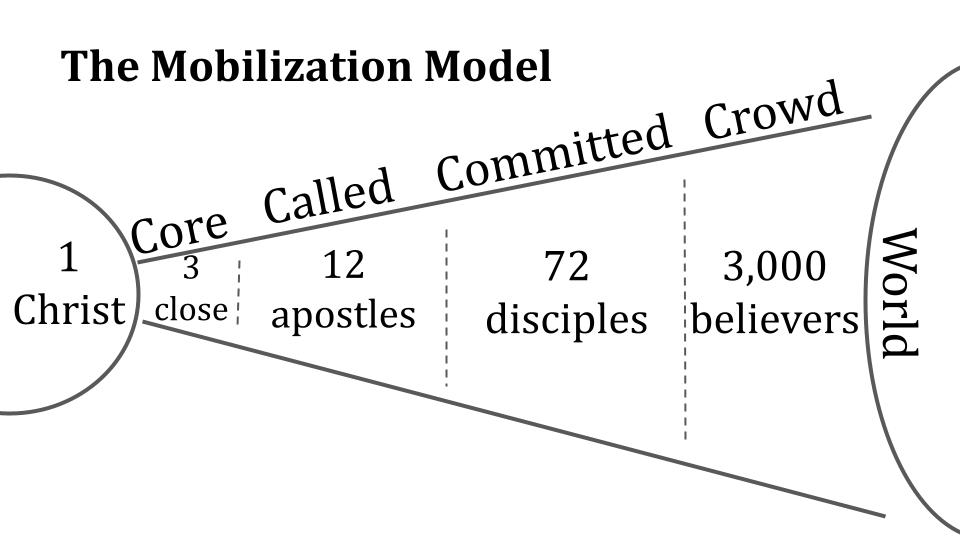
Yes, Jesus ministered to the crowds, but he invested intentionally and unapologetically in a few men “the masses would follow.” By spending three years diligently training the 12, he prepared them to reproduce themselves in a multiplying movement that in just a few generations spread throughout the entire Roman Empire.
While the assimilation model is, by its nature, reductionistic in impact, the mobilization model has potential to expand its reach exponentially. The attractional, church growth approach can help draw people into the life of a church where they can experience and respond to the gospel and be transformed. The mobilization model then takes these believers, trains them to become gospel workers and prepares them to multiply. This is our strategy – to become a HYBRID CHURCH that uses Community Groups to draw people IN and Discipleship Groups to send people OUT.

As we use our familiar systems (worship services, C-groups, programs and ministry teams) to draw people into the life of the church, we are working at the same time to train all who are willing to become reproducing disciplemakers. Community Groups remain our primary tool for connection and pastoral care. Now Discipleship Groups are becoming our primary way to help believers grow in the Lord and become fruitful in outreach. C-Groups (which include our worship services, ministry teams, classes and events) draw people inward toward the Lord Jesus and into the loving fellowship of our church family. D-Groups move people forward into greater maturity in Christ and outward into service, outreach and mission.
Oakwood has prioritized Community Groups for almost 40 years – and we continue to benefit from this legacy of fellowship and growth. We are committed to Community Groups and this disciplemaking emphasis is in no way intended to take away from this essential ministry in the life and mission of Oakwood. What D-Groups represent is simply an INTENSIFICATION of our emphasis on discipleship. Consider a typical small group meeting – it starts with fellowship and catching up on the week. Then you open the Bible to discuss, learn, share and apply God’s Word to your lives. Then you move into a time of praying for one another and your current needs and concerns. This is a wonderful model and method for drawing people INTO the life of Oakwood and INTO the life of God!
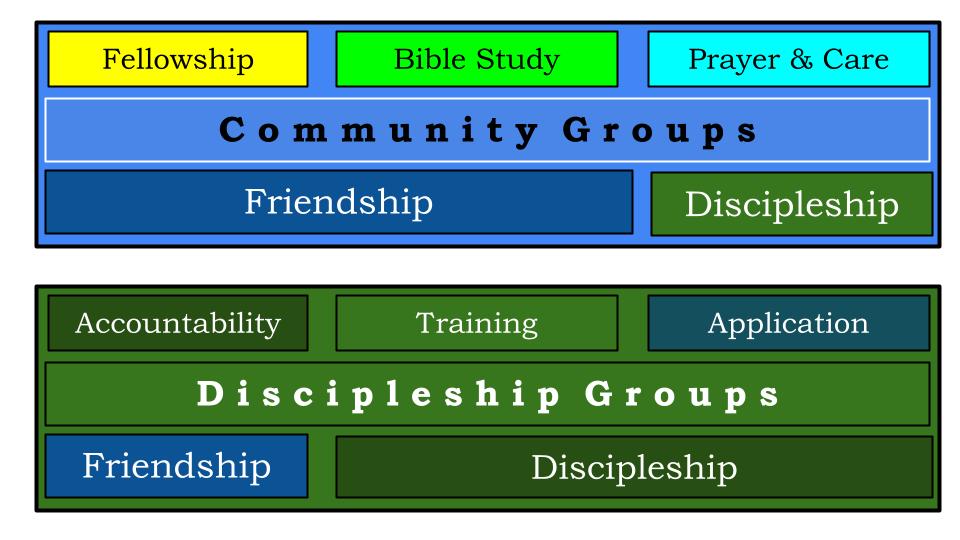
Community Groups naturally emphasize relationships and produce the vital product of FRIENDSHIP within the church, while also training believers to understand, believe and apply God’s Word to their lives. Without these connections people who visit Oakwood will not stay and we will have no real change to impact their lives much less mobilize them into the harvest. C-Groups contribute to discipleship while emphasizing friendship.
Discipleship Groups are designed to focus more on DISCIPLESHIP in the sense of TRAINING. Simply because they are smaller they can be more personalized and customized, focusing on one topic or issue in a very intense way. And the format of a D-Group intentionally prioritizes accountability, practice and planning through the 3 thirds process you’ll hear more about in a minute.
Our baseball diamond discipleship pathway calls everyone at Oakwood to love God with all they are, to grow toward maturity in Christ, to serve the church and reach the world.

All of us are called to worship, fellowship, service and evangelism, all for the glory of God! Some leaders at Oakwood will increasingly focus on D-groups while others will continue to focus on C-groups or Ministry Teams. Each leader and member needs to discern where their gifts, passions and experiences can best serve the church and the mission in the same way believers have always made choices about various ministry opportunities from the Nursery to the youth group to the worship ministry or the care of our seniors and shut-ins. No one can do everything but everyone should do something!
We are a BODY, with Christ as our head. Each part does its job as we all seek to grow up into Christ. Some will concentrate on Community Groups, helping draw people into the life of Oakwood – including the life of discipleship! Others will work more on D-Groups, providing intensive training in loving God, growing in Christ, serving the church and reaching the world.
So with the big vision of GOSPEL SATURATION – seeking to fill Tampa Bay with the good news of Jesus Christ – we are committing to the small work of DISCIPLEMAKING. We will reach every man, woman and child in Tampa Bay only as we begin to reach out to the one or two living beside us. Each is the path to every.
What does this look like for us? We picture it like baseball. First of all, we want everyone in the game. Jesus did not call us to be fans – just cheering for him from the stands. He called us to be followers – active participants in His kingdom work.
And before anyone can be a disciple-maker, you have to first be a DISCIPLE. First base is committing to love God first and foremost. Second base is to grow in Christ, to mature in godliness so that your lifestyle increasingly matches up with your beliefs. Third base is to serve the church – using your gifts to build up the body of Christ. Home plate is outreach – being salt and light where God has placed you in the world. And just like in baseball, just because you score a run by reaching home plate doesn’t mean you’re done! The game continues as you cheer for your team, come to the plate again and try to get back to first. As we mature as Christ followers we increasingly become coaches who encourage fans of Jesus to get in the game and start running the bases!
So what does a Discipleship Group do? Very simply, it calls fans of Jesus to become followers of Jesus. We are calling one another back to the original cross-shaped life of the Christ follower. It’s a life of repentance; a life of daily surrender, service and sacrifice; of constantly saying to the One we call Lord, “Not my will but yours be done.” It’s a life that increasingly LOOKS LIKE JESUS – and that can only be done by walking closely with the Holy Spirit and honestly with one or two fellow believers.
The first five sessions of a D-Group look at the simple but convicting Bible passages that best express the exhortation of each of the four discipleship bases. We start with the Great Commission (Matt. 28:16-20) to establish the truth that all followers of Jesus are disciplemakers! Every one of us is commanded to make disciples and “teach them to obey.” In other words, our mission is to make disciples who make disciples – not to win converts or teach people to know the Bible really well.
Then we go to first base with Matthew 22 and the Great Commandment to love the Lord your God with all of your heart, soul, mind and strength. The next goes to Colossians 1 and 2 and the challenge to believers who are rooted and grounded in Jesus to grow intentionally and proactively to maturity in Him. The fourth session studies and applies John 13, the footwashing, and Jesus’ command for us to “love one another” as He has loved us. And the fifth session goes to Acts 1:4-8 when the disciples were sent out to “reach the world” as witnesses for Jesus.
Each of those first five meetings ends with the members of the D-group prayerfully making gospel-fueled, Spirit-led COMMITMENTS. What does it mean for YOU to love God with all you are? What will that look like this week? The next session begins with questions about “How did it go? How did you do with loving God as you said you would?” Then session two gets into areas where you need to grow personally in your holiness and maturity in Christ. Third base will ask for commitments related to serving in the church. And session four will focus on outreach and what it means for you to be active as an evangelist, disciplemaker and missionary.
For the next 12-18 months the members of that D-Group will “call each other UP” to the fulfillment of those commitments. Yes, each of us will adjust and refine our goals along the way, spurring one another on to love and good deeds just like an athletic trainer pushes you to reach your goals by focusing on key areas, one at a time. And the leader’s job, as a spiritual trainer, is to help the D-Group members identify the right tools to help them grow where they most need to grow right now. We have several key resources we encourage everyone in D-Groups to become familiar with – like Coleman’s Master Plan of Evangelism and Colin Smith’s Momentum. But your D-Group may need to start with something on spiritual disciplines or prayer; or with a primer on relational evangelism like God Space.
The product of disciplemaking is forward movement in OBEDIENCE. So making commitments is an essential step to the D-Group process and so is holding each other to those commitments. Are these accountability groups? Yes. But not in the negative, “what not to do” sense if you remember some old men’s groups. We prefer to call these INTENTIONALITY groups that feature gospel-fueled accountability.

The engine of the church is disciplemaking. The fuel of discipleship is the gospel. It’s not white-knuckled self-discipline. That’s the law. That’s the flesh. But it’s not cheap grace permission to stay where you are either. That’s self-indulgent, consumer Christianity. The gospel cuts through both the Pharisaical religion of “older brother” legalists and the self-serving rebellion of “prodigal son” slackers. It calls us to the third way of Spirit-led, faith-filled, Christ-exalting, God-glorifying OBEDIENCE.
That engine has power! The engine of discipleship, fueled by the gospel, with the turbo-charged spark plugs of the Holy Spirit and the drivetrain of Christian community – that is a certified spiritual racing machine to power the advance of the church!
The product of a disciplemaking engine running well is OBEDIENCE: FORWARD MOVEMENT. True faith in Jesus always produces growth toward godliness and maturity in Christ. But the false gospel of cheap grace, an over-emphasis on information over application and a lack of real accountability has stifled the catalytic power of the Holy Spirit and has developed a church culture that consumes rather than produces. The gospel has power to turn this around, if we embrace the life-transforming, all-encompassing reality of wholehearted commitment to the Lord Jesus and surrender to His will.
Shifting to an organic metaphor, we are trying to create an Intentional Disciplemaking Environment (an I.D.E.). There are five specific conditions required for fruitful discipleship. Brian Phipps of the KC Underground has developed these as the five ingredients of an I.D.E. in his Disciples Made program (see the excellent podcast by that name for an introduction), as featured in Wegner and Ford’s The Starfish and the Spirit. An I.D.E. is 1) outcome focused; 2) habit fueled; 3) content flavored; 4) community forged and; 5) mission fixated.
Unfortunately, most Small Groups are CONTENT focused and COMMUNITY fixated.
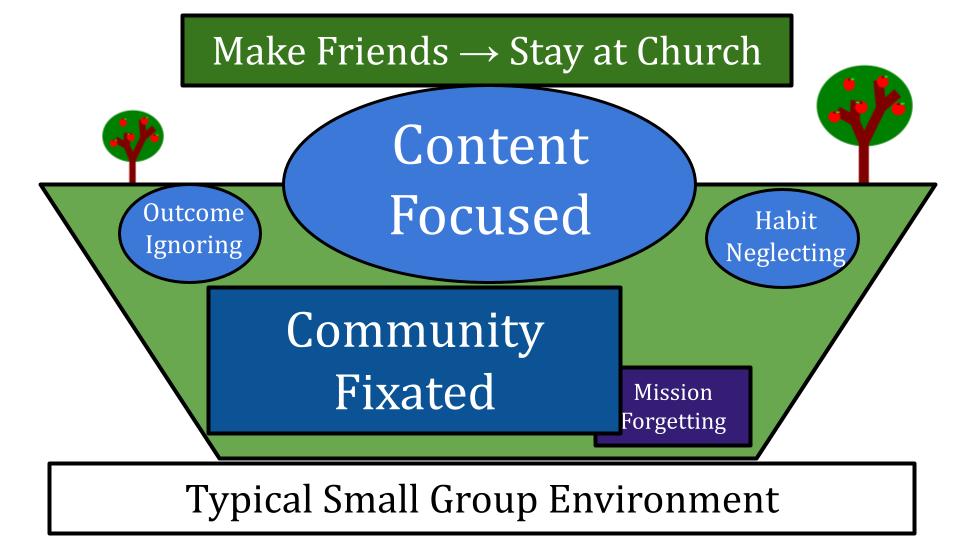
Small Groups were introduced to the American Church experience in the ‘60s and ‘70s as church growth practitioners realized that the weekend service could draw people in, but people had to develop friendships in order to stay. So small groups were developed to close the back door and keep people in the church – like spiritual fly paper. The better your church does at getting people connected, the “stickier” your church will be – so it will grow. These groups were fixated on community and focused on content – whether the Sunday sermon or some other Bible study or topic. There was very little accountability or training and almost no service or evangelism. By contrast, here are the five key ingredients of an I.D.E.
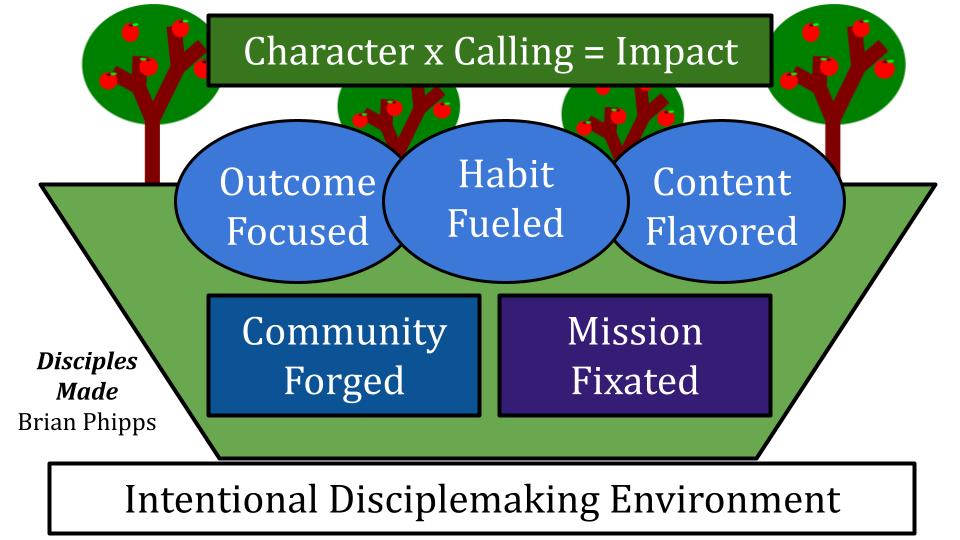
The Five Pillars of an Intentional Disciplemaking Environment
1. Outcome Focused
In order to “make disciples” we first have to know what a disciple is and when we would know that we have made one. This led to the definition of discipleship as an equation: Character x Calling = Impact. As followers of Jesus we are to become like Him in his life (character) and ministry (calling). Jesus was perfect in character, completely fulfilling all righteousness. And He was perfect in calling – obeying everything the Father asked of Him in service, all the way to the cross.
As a result, His impact was infinite, still rippling through history to this exact moment in time. Our job as disciplemakers is to help people grow in the fruit of the Spirit (character) and the gifts of the Spirit (calling). As we pursue specific, named outcomes in each area, with support and accountability from our D-Group, we can increase both sides of that equation and thereby increase our fruitfulness for the kingdom.
2. Habit Fueled
As a follower of Jesus identifies specific outcomes to pursue (e.g. growing in kindness [character] and beginning to get to know neighbors [calling]) his D-Group Leader can support him by helping him identify the habits or practices that will develop those areas. Instead of just “reading the Bible” for its own sake, you might study passages that focus on the kindness and compassion of God (Hosea, Ruth, 1 John). You might direct your prayer time to five specific people with whom you can practice kindness every day – like your spouse, your children and one particular neighbor. And you might choose a book to go through like The Art of Neighboring or B.L.E.S.S. to begin developing the evangelistic rhythms of connecting with and serving your neighbors.
Brian Phipps calls this approach H20 – Habits to Outcomes. All athletic trainers and physical therapists use this approach. Why not use it for discipleship? Define the outcomes you want to see, then design the habits that will get you there. Your D-Group will help you make adjustments as you begin to move, and will help you stick to your commitments because they know those outcomes are worth the effort!
3. Content Flavored
This pillar, as important as it is, is deliberately placed third because most American groups make content and information the focus and outcome of all of their meetings. For the American Church, content is king. We attend a worship service hoping to be inspired with a practical message. We read the Bible most days, hoping to learn something new about God. We meet for a Bible study, excited to share that new detail we had never seen before in Scripture. Is it any surprise, then, that because we are so focused on information we see so little transformation?
Of course, content is essential – as clarity about the gospel and engagement with God through Scripture are what supply the power for all real life change. But as we make disciples we need to “dethrone content,” and leverage Bible studies and books in service to our transformational outcomes. Content needs to “flavor” our meetings, not govern them. Resources need to take their proper place as nourishment for Christian growth – like healthy food for an athlete. It shouldn’t always be about the Golden Corral buffet – most of the time what we need is simple, healthy, natural food. In the same way, most of the time as followers of Jesus we don’t need in depth systematic theology discussions. Mostly we need strength and guidance for each day in terms of what to focus on now.
The first three pillars of an I.D.E. are the life-transforming water of discipleship. Outcomes, pursued with spiritual habits, infused with gospel content will bring transformation of character and calling. But the next two pillars serve as the container in which the first three can have the greatest potential for impact.
4. Community Forged
Disciplemaking is a family project not a lone ranger assignment. A helpful definition of church is “an extended spiritual family.” If we are ever going to see a disciplemaking movement in the U.S. we need to shift our understanding of the church from the place that Christians gather to the Christians gathered in any place. We need to change the language from “going to church” (meaning a building or program) to “we are the church” (an identity as the family of God on His mission together). The microchurch and missional community movement has given us models and terminology to make this shift, but we need to discipline ourselves to think and talk intentionally about what the church is (and is not).
As individual followers of Jesus pursue growth in character and calling, the Lord will lead them to specific good works (Eph. 2:10). By triangulating the signals from your Gifts, Passion and Story (GPS – see www.giftpassionstory.com and Find Your Place, Wegner & Phipps) you can discern what God is calling you to do. Obedience means taking the first steps to pursue this missionary assignment, but part of moving into your kingdom ministry must involve finding other believers who share that passion and calling. As you labor together, bringing the salt and light of Jesus where there is darkness and death, you will experience the kind of fellowship that can only take place among those attempting an impossible mission together. And that’s the fifth pillar of the I.D.E.
5. Mission Fixated
The Christian life has three directions – up, in and out. We seek God in worship (up). We love one another in community (in). And we reach out to the lost with the love and truth of Jesus (out). If you and your small group devote yourselves to worship and prayer (up) you will get some community (in) along the way. If you focus on fellowship and personal growth (in), you will get a little prayer (up) to help you. But groups that focus up or in generally don’t ever get to outreach and service (out), except in the token service project once or twice each year.
By contrast, groups that begin with mission (out) get up and in along the way. Every time. Taking on some stronghold of the enemy like poverty or addiction will force you to prayer (up) and will bond you together in relationship with your ministry partners (in). The Fellowship of the Ring is the well named book by J.R.R. Tolkien – but the team of nine came together not for the sake of fellowship. They became a fellowship as they pursued the mission to destroy the ring of power and defeat the darkness of the evil one. Similarly, The Avengers became a family as they fought the bad guys together, trying to save the world.
These are the five ingredients that are necessary to create a culture of disciplemaking. That is what will move the church forward! That is how Oakwood will grow in both numbers and maturity. And that is how the church of Tampa Bay will grow – as we increasingly mobilize every Christ follower to become a reproducing disciplemaker! That kind of movement will spread throughout central Florida and help the church advance all over the world!
Page 2/5 of Discipleship Groups at Oakwood – Click here for page 3
Page 1 – Page 2 – Page 3 – Page 4 – Page 5 / Audio / Resources
